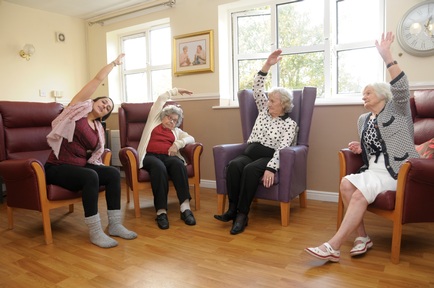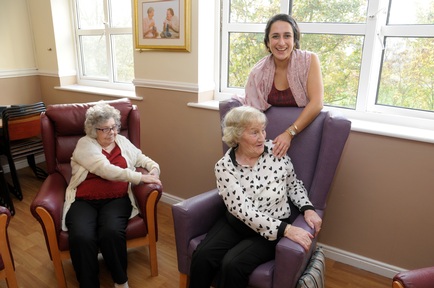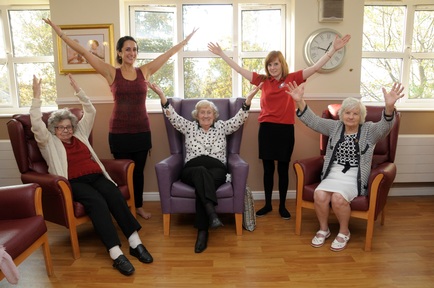Yoga projects help care home residents with dementia 'experience calm'
Yoga is a popular care home activity, improving both physical and mental wellbeing in residents and reducing agitation and anxiety. This is particularly apparent in people living with dementia, as yoga instructor Tania Plahay discovered after taking part in an 18-month project with a Four Seasons care home.

Dr Laura Phipps from Alzheimer’s Research UK explains that yoga can be a “positive way to maintain health and wellbeing.”
“We all know that keeping active is important as we age, and evidence increasingly suggests it could be beneficial for people with dementia,” she says.
“While there is a growing body of evidence to suggest that physical activity is beneficial for cognition, it’s still unclear what type and intensity of activity could be most important.”
Though just a small-scale project, Ms Plahay’s experience suggests that yoga has an abundance of benefits for people living in care homes, especially for those with dementia.
Hayley Mercer, an activities coordinator at the home, says: “Once they’ve come out of the session they are really calm. If we do it in the morning and we finish just before lunch, they’re sitting there and they’re relaxed.
“A lot of them do have anxiety and mood swings, so it’s nice for them to actually experience calm.”
Karen Cullis, another activities coordinator, adds that she observed a marked improvement in memory and cognitive skills in residents with dementia who took part in the workshop.
“I didn’t see one resident for about an hour and she still said to me when she saw me again ‘Just wanted to say thank you for this morning, I feel so much better!’,” Ms Cullis recalls.
“So it obviously has an impact and if they are able to remember what they’ve done that’s brilliant.”
‘Simple and effective practices’
The project came about as a result of Ms Plahay’s desire to spread the benefits of “simple and effective practices” she had developed through volunteering in care homes as well as caring for her father and her grandmother.
She explains: “When I was at university my father was in a nursing home for a short period after having a stroke.
“When visiting him I was deeply saddened by the lack of physical activity and social interaction in the home.
“My grandmother developed dementia and moved to a nursing home, so I have seen first-hand the devastating effect of this condition on people and their families.
“After finishing my first yoga teacher training, I was passionate about bringing the simple benefits of yoga to the older generation, in particular those with dementia. I believed that appropriate movement and relaxation techniques could really benefit this group.”
She reveals that, during her time volunteering at a local care home, she noticed how residents benefited physically and mentally after just a few months.
While formal research in this area is limited, stories from care homes that offer yoga as a daily or weekly activity provide anecdotal evidence that gentle exercise such as yoga can improve wellbeing.
Hallmark care homes provide weekly yoga sessions for residents living with dementia, and these have proved successful, particularly for those that participate regularly.
‘One resident casually stood from her wheelchair and struck a tree pose’
Sarah Savidge, lifestyles leader at one of the homes, explains how their yoga instructor of two years “works wonders” with the residents.

“She has built up an amazing relationship with them, and for some who for the most part are mobilised using a wheelchair, have stood up and by then bit by bit begun to walk with a frame following her sessions,” she says.
“Residents living with later stages of dementia have also begun to interact with the group, making eye contact and even talking.
“One care team member was amazed that a resident, in her late 80s, quite casually stood up from her wheelchair during a session, took off her cardigan and struck a tree pose!”
The physical benefits were clear to Ms Plahay and her team too.
One resident told Ms Plahay and the staff team “I felt like I had a great workout,” while another explained that she liked “doing the yoga because it helps my legs.”
Comments from family members also proved how the classes benefitted residents’ physical wellbeing, with one resident’s daughter saying: “I think they are great. The classes keep them busy and a healthy body is a healthy mind.
“Mum is fitter than I am. It’s the truth, she runs around like a two-year-old.”
Emotional and psychological benefits
Martin Green, chief executive of Care England, backed the project, initially introducing Ms Plahay to Maggie Candy, a progressive care home manager who was working at the Four Seasons home at the time.
He told Ms Plahay that he is “really interested” in the work that’s going on around yoga in care homes “because I can see the benefits of it.”
“There are not only physical benefits but there are also a lot of mental and support benefits to yoga and I’ve seen some really good examples of how it can work and the outcomes for people who live in care homes, whether they live in care homes with physical disabilities or, are indeed, living with dementia.
“I think there’s a real need to get people doing physical activities in care homes. If we’re not careful, people who live in care homes can lead a quite sedentary life.

“One of the things I like about yoga is that it is something that people can engage with at different levels, and it’s also something that when people start, they often develop a real interest in it and then of course as they get more confident, they engage much more in yoga, and this really does show both physical and spiritual benefits.”
Ms Savidge from Hallmark also noted how psychological wellbeing can improve as a result of yoga sessions.
She says: “Socially and emotionally also, the benefits are huge. Yoga engages and exercises different parts of the brain through chanting, visualisation, breathing, movement and postures.
“It seems to lessen depression, decrease anxiety, increase appetite and help to form valuable friendships.”
The social side was also evident in Ms Plahay’s project, with residents commenting that that “really like being with everyone.”
‘Worth exploring further’
Mr Green added that he believes cognitive functions are “really improved” by yoga, suggesting that there is an opportunity for further research in this area, which Dr Doug Brown, director of research at Alzheimer’s Society, agreed with.
Dr Brown says: “We still need to know more about the benefits of different kinds of exercise for people with dementia and there isn’t much research into the benefits of yoga specifically – but given it’s a really popular form of exercise it would certainly be worth exploring this further.”
Since completing the project, the yoga sessions have continued in the Four Seasons home and Tania Plahay has spent time working with private clients living with dementia, developing further appropriate yoga sequences, which are due to be published as a book.
She says: “I really believe these sequences can benefit so many people and I’d be interested in working with other care homes in the UK.”
Ms Plahay’s ‘Yoga for People Living with Dementia in Residential Care Settings’ project was funded by the Foundation for Nursing Studies and sought to integrate yoga into a care home environment, including training staff and activities coordinators to deliver simple yet effective techniques.
For more information and to read the full report please visit: taniayogini.com/yoga-and-dementia/
Latest Features News
 25-Nov-19
2019 Election: Boris Johnson leaves social care in 'too difficult box' but Labour vows to end 'crisis'
25-Nov-19
2019 Election: Boris Johnson leaves social care in 'too difficult box' but Labour vows to end 'crisis'
 18-Oct-19
Podcast: Wendy Mitchell and dementia: 'My biggest fear is not knowing who my daughters are'
18-Oct-19
Podcast: Wendy Mitchell and dementia: 'My biggest fear is not knowing who my daughters are'
 27-Sep-19
Exclusive: Care minister backs care workers' call for time off to grieve and attend funerals
27-Sep-19
Exclusive: Care minister backs care workers' call for time off to grieve and attend funerals
 19-Sep-19
Podcast: Gyles Brandreth says poetry helps ward off dementia
19-Sep-19
Podcast: Gyles Brandreth says poetry helps ward off dementia
 30-Aug-19
Edinburgh Fringe funnyman joins comics facing toughest audience at care home gig
30-Aug-19
Edinburgh Fringe funnyman joins comics facing toughest audience at care home gig